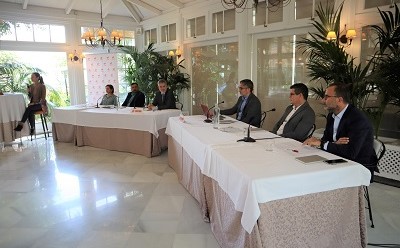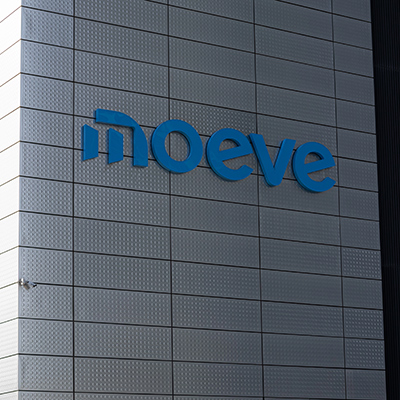- The third meeting of this forum addresses the current moment of change and stresses that strategic plans and activities should be customer-oriented
- The cycle, promoted by the Cepsa-Santa Cruz Liaison Committee, advocates the rapprochement and exchange of best practices between the energy company and the Canary Islands society
The purpose of this discussion forum is to promote the rapprochement and exchange of best practices between Cepsa and the Canary Islands community, through the potential and experience of the company's professionals. For the first time since its launch in 2021, the meeting was held in person, as well as offering the option to attend remotely.
Under the title “Society advances, organizations transform,” the opening speech was given by the head of Operations at Cepsa Tenerife, Rosendo Rivero. Then the topic was opened up for debate, with the participation of the director of Cepsa in the Canary Islands, José Manuel Fernández-Sabugo; the director of the Social Innovation Laboratory at the University of La Lagun, Mónica Dios; the island director of Modernization of the Tenerife Council, Daniel González; the director of the Association for the Progress of Management in the Canary Islands, Francisco Torres; and the technical director of Plena Inclusión Canarias, Francisco Medina.
Rosendo Rivero stated that "we are witnessing an unprecedented change in how human beings interact with each other and with the environment," and added that "the evolution of organizations must be centered on people, who are the main drivers behind new value propositions." For this reason, he stressed that organizations’ strategic plans, procedures, and activities must be more customer-oriented than ever.
He pointed out that an organization’s customers, in addition to those who receive a product or service, include stakeholders, suppliers, and the employees themselves. In this sense, he emphasized that the current challenge for organizations is to rely on their most valuable resource – their professionals – to empower them and to perform an activity that meets the needs of a changing and competitive world. Along these lines, he stressed that companies must not only address digital and energy adaptations, but above all a human adaptation, bearing in mind that people are more important than ever.
Communication, a key tool
Rosendo Rivero presented Cepsa's proposal in this area and emphasized that communication is a key tool for promoting change in any organization. In this regard, he referred to the need to reinforce communication order to convey relevant information in a transparent manner, in addition to listening to the teams and transmitting feedback internally. He also emphasized the role of leaders who move away from the traditional concept of the boss, to become facilitators in their teams when it comes to implementing changes, encouraging all to participate in continuous improvement, and promoting the empowerment and responsibility of the team. In addition, they must foster effective interactions and a sense of belonging, aligning themselves with the organization’s objectives and policies.
He added that Cepsa is committed to an honest and ethical attitude, which it conveys to its suppliers, in addition to being aligned with the Sustainable Development Goals, a culture of safety, the defense of diversity and inclusion, and employee work/life balance, among other aspects.
Moreover, he stressed that business transformation cannot take place without a dynamic digital transformation, which takes into account the company’s needs and objectives. This, he added, will ultimately improve workers' performance, facilitating and speeding up different processes.
Rosendo Rivero also discussed the process of organizational transformation that Cepsa is undergoing. Through this process, it aspires to play a relevant role in the energy transition, and is committed to moving with society towards a more sustainable world through its Strategy 2030 for a new Cepsa, which was presented at the end of March.
In this regard, he mentioned some of the most recent projects related to the company's work on using green hydrogen as an energy vector; the decarbonization of transportation through sustainable biofuels together with strategic partners such as Binter, Iberia, and Air Nostrum; a new concept of service stations; as well as electric mobility solutions.
Transformation, a vital necessity
During the debate, the participants in the round table discussion agreed that the need for transformation is vital and shared by companies, social entities and the Administration itself, as well as civil society.
In this sense, José Manuel Fernández-Sabugo highlighted Cepsa's commitment to change and stated that the energy transition is a response not only to the need for survival, but also aims to contribute added value, and Cepsa aspires to become a relevant player in this process. He noted that transformation is a fast-moving, global phenomenon in which the teams play a key role.
For his part, Daniel González discussed the Tenerife Council's modernization plan, aimed at changing the way public services are provided through organization and defining clear shared objectives. He listed improved public services, reducing the administrative workload, and decreasing processing times as some of the goals proposed, in addition to transparency and the participation of society.
Mónica Dios shared the work carried out by the Social Innovation Laboratory at the ULL, created three years ago with the aim of experimenting and proposing realistic solutions that are capable of responding to current problems and challenges through collaborative work and partnerships between citizens and the public and private sectors. She emphasized the lab’s role as a facilitator by applying research and reorienting actions according to needs. She affirmed that it represented a marked commitment to a more familiar transfer of knowledge.
From the APM, Francisco Torres emphasized the need for companies to adapt to a challenging environment, through constant renewal and adaptation, and made clear the role that leaders must play in order to achieve adequate change management. He also mentioned the energy transition process underway in the Canary Islands, where they are making a strong commitment to renewable energies, which could turn the Islands into a global laboratory.
Finally, Francisco Medina underlined the need to innovate in service models aimed at the most vulnerable people, which have traditionally been created from a deficit approach, focused on people's limitations. He also argued for the deinstitutionalization of the protection system for the most vulnerable people, through social transformation, trying new ways of doing things so that they can lead a dignified life. This task, as he pointed out, requires everyone's involvement.
Those interested in accessing the recording of the three Dialogs in Action sessions held to date can do so on Cepsa's official YouTube channel. Specifically, this third session can be accessed by clicking here.



